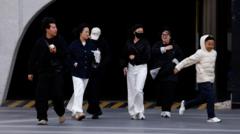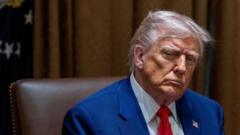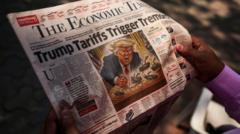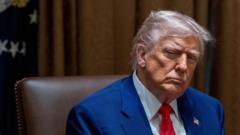Amidst soaring interest rates and fears of a recession, the impact of tariffs imposed by Donald Trump on imports raises concerns about the future of the US economy.
**Trump's Tariffs Trigger Major US Government Debt Sell-Off**
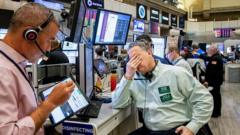
**Trump's Tariffs Trigger Major US Government Debt Sell-Off**
Investors lose confidence in US economy as tariffs spark a significant sell-off of government bonds.
The recent implementation of sweeping tariffs on imports from around 60 countries, led by President Donald Trump, has instigated a considerable sell-off of US government debt, with investors increasingly wary of the economic outlook. Once regarded as a "safe haven" for investment, US bonds have seen a dramatic rise in interest rates, reaching a notable 4.5%, marking the highest level since February.
The backdrop of this financial tumult features ongoing tensions between the US and China, where a retaliatory trade war has intensified following the US's imposition of a staggering 104% tariff on certain Chinese goods. In retaliation, China has responded with an 84% import tax on American products, further exacerbating the economic uncertainty that has gripped markets.
The fallout from these developments has left stock markets in disarray and sparked alarming shifts in the bond market, where the yield on US Treasuries—essentially IOUs from the government—has climbed sharply. In just 48 hours, rates surged from 3.9% to a concerning 4.5%. This scenario poses severe challenges for the world's largest economy, as higher borrowing costs could limit financial flexibility.
The Federal Reserve may find itself in a position where it must intervene to stabilize the bond market. According to George Saravelos, a leading analyst at Deutsche Bank, the current environment is unprecedented, adding that predictions of market behaviors have become increasingly dubious.
In an assessment from Simon French, chief economist at Panmure Liberum, potential cuts to interest rates could be an avenue for the Fed to pursue in order to help businesses weather the economic storm created by tariff impacts. His analysis suggested that the probability of a US recession has increased dramatically, now standing at a worrying 60%, with significant consequences for employment and income levels looming on the horizon.
The tariffs introduced by Trump aim to shelter American industries from foreign competition while simultaneously driving an increase in domestic production. However, these measures risk destabilizing existing global supply chains, presenting US-based companies with the financial burden of compliance. The dilemma companies face is stark: absorb the costs associated with tariffs or pass them on to consumers, leading to inflationary pressures.
Additionally, the identity of the investors offloading US bonds has come under scrutiny, with conjectures surfacing about potential sales by foreign governments, including China, which possesses an estimated $759 billion in US Treasury debt. As Saravelos aptly noted, the growing trade dispute escalates the risk of a financial confrontation with significant ramifications for both nations, cautioning that a "winner" is unattainable in such conflicts.
As the economy hurtles toward uncertainty, observers are left pondering whether the US is on the brink of recession—a scenario that could profoundly affect consumers, businesses, and investors alike.
The backdrop of this financial tumult features ongoing tensions between the US and China, where a retaliatory trade war has intensified following the US's imposition of a staggering 104% tariff on certain Chinese goods. In retaliation, China has responded with an 84% import tax on American products, further exacerbating the economic uncertainty that has gripped markets.
The fallout from these developments has left stock markets in disarray and sparked alarming shifts in the bond market, where the yield on US Treasuries—essentially IOUs from the government—has climbed sharply. In just 48 hours, rates surged from 3.9% to a concerning 4.5%. This scenario poses severe challenges for the world's largest economy, as higher borrowing costs could limit financial flexibility.
The Federal Reserve may find itself in a position where it must intervene to stabilize the bond market. According to George Saravelos, a leading analyst at Deutsche Bank, the current environment is unprecedented, adding that predictions of market behaviors have become increasingly dubious.
In an assessment from Simon French, chief economist at Panmure Liberum, potential cuts to interest rates could be an avenue for the Fed to pursue in order to help businesses weather the economic storm created by tariff impacts. His analysis suggested that the probability of a US recession has increased dramatically, now standing at a worrying 60%, with significant consequences for employment and income levels looming on the horizon.
The tariffs introduced by Trump aim to shelter American industries from foreign competition while simultaneously driving an increase in domestic production. However, these measures risk destabilizing existing global supply chains, presenting US-based companies with the financial burden of compliance. The dilemma companies face is stark: absorb the costs associated with tariffs or pass them on to consumers, leading to inflationary pressures.
Additionally, the identity of the investors offloading US bonds has come under scrutiny, with conjectures surfacing about potential sales by foreign governments, including China, which possesses an estimated $759 billion in US Treasury debt. As Saravelos aptly noted, the growing trade dispute escalates the risk of a financial confrontation with significant ramifications for both nations, cautioning that a "winner" is unattainable in such conflicts.
As the economy hurtles toward uncertainty, observers are left pondering whether the US is on the brink of recession—a scenario that could profoundly affect consumers, businesses, and investors alike.




